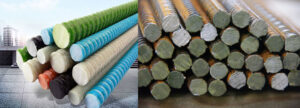Fiberglass Reinforced Plastic (FRP) rebar has become increasingly popular in the construction industry due to its numerous advantages over traditional steel rebar. In this article, Unicomposite pultruded profiles will compare FRP rebar to traditional steel rebar to help you make an informed decision for your construction projects.

Corrosion Resistance
One of the biggest advantages of fiberglass-reinforced plastic rebar is its superior corrosion resistance. Steel rebar is susceptible to rust and corrosion over time, which can compromise the structural integrity of the reinforced concrete. On the other hand, FRP rebar is made of a composite material that is highly resistant to corrosion, making it an ideal choice for structures that are exposed to harsh environments.
Lightweight
FRP rebar is also much lighter than steel rebar, making it easier to handle and transport. This is especially important in projects that require a lot of rebars, as the weight of the steel can quickly add up and become a logistical challenge
Non-Magnetic
Another advantage of FRP rebar is that it is non-magnetic. This makes it an ideal choice for projects that require non-magnetic materials, such as MRI rooms in hospitals.
Electrically Non-Conductive
FRP rebar is also electrically non-conductive, which makes it a safer option for structures that are exposed to electrical currents. Steel rebar can conduct electricity, which can be a safety hazard in certain situations.
Cost-Effective
While FRP rebar may be more expensive than steel rebar on a per-unit basis, it can be more cost-effective in the long run due to its durability and resistance to corrosion. FRP rebar does not require regular maintenance or replacement like steel rebar, which can result in significant cost savings over time.
Strength and Durability
FRP rebar is as strong as steel rebar but has the added advantage of being more durable. FRP rebar does not corrode or rust, which means it can maintain its strength over time, whereas steel rebar can weaken due to corrosion and rust.
Ease of Installation
FRP rebar is easy to cut and install, making it a popular choice among contractors. Unlike steel rebar, which requires special equipment and safety precautions, FRP rebar can be cut with standard saws and installed using traditional construction techniques.
Conclusion:
In summary, while both fiberglass reinforced plastic rebar and steel rebar have their advantages and disadvantages, FRP rebar is becoming increasingly popular due to its superior resistance to corrosion, and lightweight, non-magnetic, and electrically non-conductive properties. While it may be more expensive initially, it’s durability and lower maintenance requirements can result in cost savings over time. Additionally, its ease of installation and comparable strength to steel rebar makes it a practical choice for construction projects of all types.
When deciding which type of rebar to use, it is important to consider the specific needs of the project, including the environment, structural requirements, and budget. By comparing the benefits of FRP rebar to traditional steel rebar, you can make an informed decision that will result in a safer and more cost-effective project.
If you want to use fiberglass reinforced plastic rebar for your construction project, Unicomposite, a specialized FRP supplier in China, can provide you with various FRP products and custom composite parts. With our experienced production line, professional team, and technology guiding, we can provide standard fiberglass pultrusion profiles and custom products or solutions for your FRP project needs. If you have this demand, please contact us.
 info@unicomposite.com
info@unicomposite.com


























